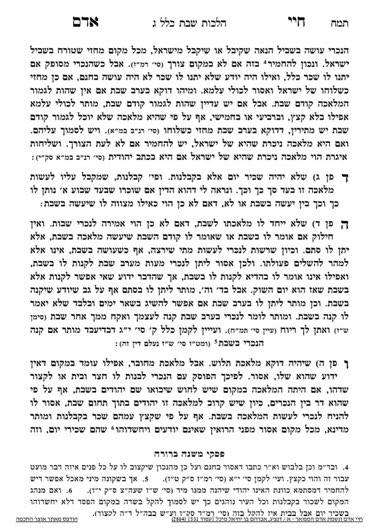We have finished siman 4, which discusses the criteria that the non-Jew be hired as a kablan. We learned that the Chayei Adam holds that in addition to the simple definition of a kablan (when the non-Jew is hired for a specific job, such as to fix an engine or sewing a garment), if the non-Jew is hired for a longer period of time, such as for a week, there is no specific connection to the work performed on Shabbos, because the non-Jew can choose to do the work whenever they want, and it is muttar for the non-Jew to work on Shabbos.
However, this last point is a machlokes. In siman 244:5, the Shulchan Aruch brings the opinion of the Rambam, who holds it is permitted for the kablan to work on Shabbos provided it is for an extended period of time. Then he writes that yeish omrim (some say) it is assur. The general rule is that when the Shulchan Aruch brings one opinion as a statement, and a second opinion as a yeish omrim, the halacha is in accordance with the first opinion. The Rema adds a condition. The Rambam brings the example of a person who hires an in-house, salaried scribe, who was hired for the entire year. The Rema writes that if the non-Jew is hired for all types of work, such that as soon as he is done with one project he will move onto something else, the fact he is working on Shabbos benefits the Jew that he is available to do something else the next day. Thus, such a case would be assur.
The Rema correlates to criteria seven, that the Jew cannot benefit from the fact the work was performed on Shabbos specifically. The Magen Avraham writes that the Rema would apply even when a person is hired for only one job, but there is a continuous amount of work, such as a scribe who always has what to copy. The heter is based on the fact that the worker has the option not to work on Shabbos, so if he works on Shabbos it was out of his own volition. If he has to work on Shabbos, he loses that independence.
The Rashba disagrees, and holds it is assur, as we saw in the Shulchan Aruch above. The Chayei Adam paskens likes the Rambam that it is muttar, and adds that even if he was only hired for the week (and not a year as brought down by the Rambam and Rema), as long as he has the independence to work when he chooses, he is considered a kablan and it is muttar for him to work on Shabbos.
The Mishnah Berurah quotes the opinion of the Taz. who is even more lenient than the Rambam. The Taz holds that the only time it is assur is when the kablan is hired for a job and it would be impossible to finish the job within the required timeframe without working on Shabbos. The Rema and Magen Avraham are machmir, and it would appear the Chayei Adam follows the Rema as well.
This brings us to the next point, that the work performed on Shabbos must be for the benefit of the non-Jew, and the Jew cannot be meyached melachto, invariably cause for the melacha to be performed on Shabbos. We will discuss this criterion in the next shiur, be’ezras Hashem.
Summary
- A kablan who is paid by the hour is considered a kablan, as long as the primary element of the arrangement is the completion of the job, not the time it takes.
- An individual who is hired for a large amount of time is considered a kablan, even though he is not hired for a specific project, as long as the non-Jew retains the freedom to decide when they would like to perform the work. The Chayei Adam holds that even a week is considered a large enough amount of time for this purpose.



